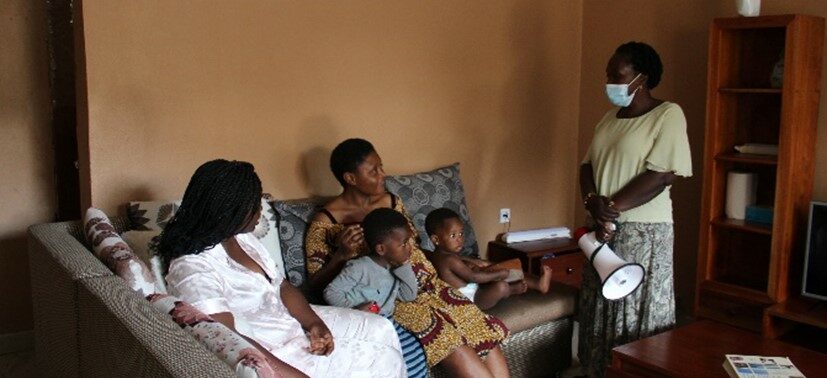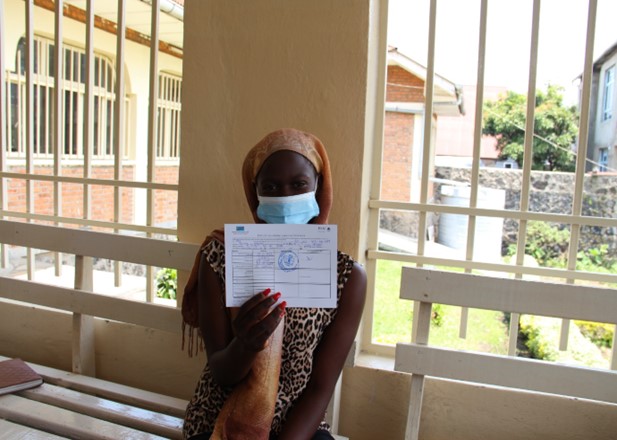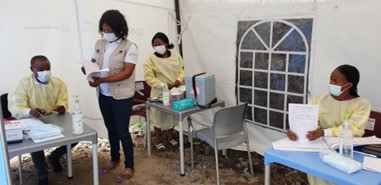International Women’s Day: Women Working Together to Combat COVID-19 in the DRC
Published on February 27, 2023

by Mussa Kachunga Stanis, MOMENTUM Integrated Health Resilience DRC Knowledge Management and Communications Lead
Yvonne Furah is a community health worker trained by MOMENTUM Integrated Health Resilience to support the Democratic Republic of the Congo (DRC) Ministry of Health (MOH) to stop the spread of COVID-19 through vaccinations. Her community is part of the Carmel Health Area of the Goma Health Zone, one of 10 health zones that MOMENTUM partners with in North Kivu Province.
COVID-19 is still a strong force in Sub-Saharan Africa, and vaccination rates remain low. In the DRC, women supported by MOMENTUM are working together to encourage the uptake of COVID-19 vaccines.
The challenges are significant. The DRC has one of the lowest vaccination rates in the world, with fewer than 10 percent of the population having been immunized against COVID-19. Additionally, fewer women and girls are being vaccinated against COVID-19 compared to men and boys. This may be due, in part, to misinformation that the vaccine causes women to become infertile. But being a member of her community means Yvonne is valued and trusted by her peers as she works to address the disparities and the rumors.
“When it comes to COVID-19, mothers in my community listen to and trust me, because I’m a community member and not someone from outside,” explains Yvonne. “The training I received from MOMENTUM gave me the information and confidence I needed to encourage women, men, and youths to go to their closest health facility to get the COVID-19 vaccine. I also remind people about the importance of hygiene measures like regular hand washing, and I encourage them to seek care and get tested when they feel unwell.”
MOMENTUM works with over 240 community health workers like Yvonne who support the MOH. Included in this work are 17 MOH mobile vaccination teams who receive funding and training from MOMENTUM. The mobile teams prioritize communities and public structures where health workers like Yvonne have laid the groundwork to create vaccine demand. In the last quarter of 2022, 11,560 people in North Kivu obtained at least one dose of the COVID-19 vaccine.
Yvonne spreads her life saving messages during visits to homes and public places in her community. But of course, there are challenges: “Some people accept our messages, but others still think that COVID-19 does not exist,” says Yvonne. “I try to convince them about how many people got the disease out of neglect, some of whom have died, leaving behind their families and dreams.”
Local student Elyse Mapendo, age 24, got vaccinated after being persuaded by Yvonne and her CHW colleagues, and after seeing others getting vaccinated at MOMENTUM-sponsored events:
“As a student, I often have to be with lots of people. This kept me worried about the risk of getting COVID-19 and spreading it to my family. When I saw the doctors and local officials get vaccinated, I didn’t hesitate any longer. Today, I do not regret getting vaccinated. It helps me to know I am no longer a risk to those I love,” Elyse explains.

Behind Yvonne and her colleagues is Dr. Emily Shungu, mother of two and a MOMENTUM COVID-19 Technical Officer. Her focus is mainly on assisting COVID-19 vaccination roll out by supervising the refrigerated storage and administration of vaccines, the disposal of generated waste, and compliance with infection prevention and control during vaccination sessions. She also monitors the identification and management of adverse post-vaccination reactions.
“The pandemic completely changed my life as a frontline worker. It taught me to value my time and focus on providing information to strengthen awareness and fight rumors,” said Emily. “As a COVID-19 Technical Officer, I have come to realize that health remains one of the most valuable things that humans possess. I have also learned the need to quickly adapt our work with changes in the health and community contexts.”
While Emily said that her main concerns are vaccine shortages and rumors that can limit access and uptake of COVID-19 vaccines, she said there is always hope.

“I value being part of the women who support health through access to COVID-19 vaccines and other health services. My hope for the future is that the vaccine will be widely accessible to all, so that we can end this pandemic. Seeing the outstanding resilience of the people we serve amid big global crises keeps me motivated,” Emily says.
As we celebrate International Women’s Day, we applaud the women who help other women to remain healthy, ultimately leading to more resilient families and communities.

